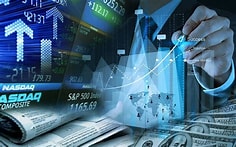The difference between trading in the stock market and forex.
- Home
- The difference between trading in the stock market and forex.
- By Signals View Academy
- Last Update 2026-Feb-16
The difference between trading in the stock market and forex.
Trading on the stock exchange and trading in forex are two different types of financial markets, but they share the same fundamental goal of buying and selling financial assets with the aim of making a profit. Here is the difference between them:
1. Market:
Stock Exchange Trading: The stock exchange is a central market where stocks, bonds, mutual funds, and other financial assets are traded. Some of the most famous stock exchanges in the world are the New York Stock Exchange (NYSE) and the London Stock Exchange (LSE). Stock exchanges are characterised by having specific trading hours and a physical or electronic location.
Forex Trading: The forex market (foreign exchange) is a decentralised market where currencies are traded. This market does not have a fixed physical location like the stock exchange; rather, it is a global market where participants trade 24 hours a day, five days a week. Forex is the largest financial market in the world.
2. Financial Instrument:
Stock Exchange Trading: In the stock exchange, stocks, bonds, exchange-traded funds (ETFs), and other financial instruments are traded. Traders deal with specific companies and buy or sell their shares based on their analyses.
Forex trading: In forex, foreign currencies (such as the US dollar, euro, British pound) are traded. Currencies are traded in pairs, such as EUR/USD or GBP/USD, meaning that one currency is not just bought, but one currency is bought against another.
3. Trading hours:
Stock trading: Stock exchanges have specific trading hours, often from 9:30 AM to 4:00 PM New York time, for example. These are fixed hours that traders rely on.
Forex trading: The forex market is open 24 hours a day, five days a week. This is because currencies are traded in multiple markets around the world (such as London, New York, Tokyo, and Sydney), so trading never stops.
4. Market size and liquidity:
Stock trading: Although stock markets are large, liquidity can vary from one stock to another. Large stocks like technology companies (such as Apple or Microsoft) have high liquidity, while smaller stocks may be less liquid.
Forex Trading: The forex market is the largest in the world in terms of volume and liquidity. Currency trading occurs in massive amounts daily (over 6 trillion dollars a day), making it more liquid than stock markets.
5. Costs and Commissions:
Stock Trading: In the stock market, traders must pay commissions and execution times that may vary depending on the exchange and the financial broker. There may also be other fees such as listing or withdrawal fees.
Forex Trading: In forex, there are usually no direct commissions; profits are made through the difference between the buying price and the selling price (the spread). The spread can be fixed or variable depending on the broker.
6. Analysis and Methods Used:
Stock Trading: Stock traders often use fundamental analysis more (such as analysing companies' financial data and earnings reports) alongside technical analysis to identify trading opportunities.
Forex Trading: In forex, technical analysis is used more, as the market heavily relies on price movements and global factors such as economic news, monetary policy, and interest rate changes.
7. Strategies:
Stock trading: Stock traders typically target long-term investment strategies such as buying shares and holding them for extended periods, alongside short-term strategies like day trading.
Forex trading: In forex, strategies are more focused on the short term, such as day trading, swing trading, or real-time technical analysis to capitalise on rapid price movements.
8. Risks:
Stock trading: Trading in the stock market carries risks associated with the financial performance of companies, economic events, and market volatility. The market is usually less volatile compared to forex.
Forex trading: Forex can be more volatile due to political and economic factors affecting currencies, such as changes in interest rates, economic crises, or political tensions. Additionally, margin trading in forex can increase risks.


Comments : 0